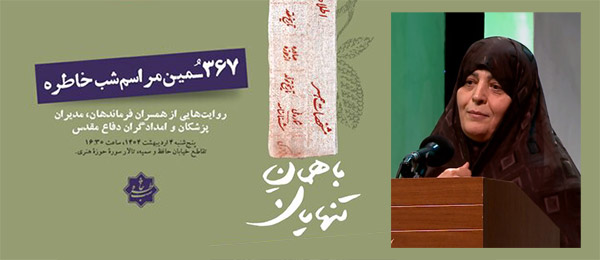The 367th "Night of Memory"
Edited by Iranian Oral History Website
Translated by Mandana Karimi
2025-5-8
The 367th "Night of Memory" program was held on Ordibehesht 4, 1404 (April 23, 2025), coinciding with the anniversary of the martyrdom of Imam Ja'far al-Sadiq (PBUH), at the Andisheh Hall of the Arts Center of the Islamic Revolution. The event featured stories shared by several wives of medical corps veterans from the Holy Defense. The speakers included Mrs. Masoumeh Khatib, Ashraf Fard, Zahra Mazloumifar, Fatemeh Amrollahzadeh, and Fatemeh Habibi.
Also during the ceremony, with the presence of Major General Seyyed Yahya Rahim Safavi—senior advisor and special aide to the Supreme Commander-in-Chief— the book “With the Lonely Ones” by Maryam Nezam-Doust was unveiled. The program was hosted by Davood Salehi.
The first speaker was Mrs. Masoumeh Khatib, the wife of the late Abdolhossein Pourbashash. She began by honouring the memory of her husband and said: “He always used to say, ‘I have made a deal with God in this war.’” Recalling the days she accompanied him in hospitals where chemical weapon victims were being treated, she added: “At some point, I could no longer continue that deal with God. I told my husband, ‘I will take care of everything at home; you fulfil your mission.’ I still regret that I couldn’t be as good a dealer with God as he was.”
“My husband was a commander who held no official rank of general, but he was a general in people’s hearts.”
She continued:
“My husband was at the front just a few months after our marriage. Sometimes, we had phone calls just to check in on each other. Then Operation Badr began, and during that operation, he was exposed to chemical weapons. He didn’t want to upset me, so whenever I called, he wouldn’t answer. In the days that followed, when I tried again, a man told me that my husband was attending to the wounded and couldn’t come to the phone.

As his condition worsened, he was transferred to Tehran. After some time, when he got a bit better and was discharged from the hospital, he returned to Shiraz. Still, he didn’t tell us anything about his injury or exposure to chemicals. He showed symptoms like coughing and chills, and eventually, the doctors concluded that he had developed leukemia. Only my mother knew about his illness, and since she regularly attended mosque and prayer gatherings, she shared it there and asked people to pray for his recovery.”
The speaker continued:
“We had the chance to travel to Mashhad, and while we were there, my husband’s illness worsened. He developed a high fever and a severe cough and had to see a doctor. But since he knew the doctor might say something that would upset me, he didn’t allow me to go with him to the clinic. The doctor told him that the cancer had returned as a mass in his lungs and that he needed surgery in Tehran as soon as possible.
While my husband was at the doctor’s, the kids and I went to the shrine (of Imam Reza) and prayed for his healing. We also brought back some blessed water from the Saqqakhaneh (sacred water source) for him. When we went to Tehran for the surgery, after the examination and tests, the doctor said there was no trace of cancer or chemical injury in his body. He only had a mild infection, which could be treated with antibiotics.
This was a miracle that, thanks to Imam Reza (PBUH) and my mother’s prayers, was granted to our family—and my husband was healed.”
Number of Visits: 639








The latest
Most visited
A Statistical Glance at the Oral History Archive of Iran
The Oral History Weekly, an electronic periodical that commenced its regular publication in November 2010, now stands on the threshold of releasing its 700th issue. Published every Wednesday, the newsletter consolidates all content posted on the Oral History website over the preceding week and circulates it to more than 850 subscribers via email. This report—drawing upon statistical data from content published on ...A Memory of an Army Aviation Pilot
I was taking a nap in my office when the door opened and a soldier entered the room. I got up from my chair and after arranging my clothes, I prepared to hear the soldier's news. After saluting, he said, "Captain, the commander has business with you." And with this, he paid military respect and left the room.Monafeghin: A New Deception
July-August 1989Following the discussions around the asylum of Iraqi prisoners of war in Iran during peace negotiations, the Iraqi side, not wanting to fall behind, launched their own campaign to offer asylum. At the outset, they attempted to attract prisoners by making grand promises ...
Supports from Guilds and Bazaars peaple
Memoirs of Haj Hossein FathiOur base of operations had become the Saheb al-Zaman Mosque in the Kamp-Lou neighborhood of Ahvaz. With the assistance of Brother Khani and his companions, we began preparing hot meals and sending them to the frontlines. We ourselves, along with several fellow merchants from the bazaar, entered the conflict zone, bringing warm clothing, ...


